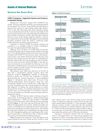Increased Risk of Chronic Fatigue and Hair Loss Following COVID-19 in Individuals with Hypohidrotic Ectodermal Dysplasia
September 2021
in “
Orphanet Journal of Rare Diseases
”

TLDR People with hypohidrotic ectodermal dysplasia are more likely to experience long-term fatigue and hair loss after COVID-19.
The document presents three studies on the increased risk of chronic fatigue and hair loss following COVID-19 in individuals with hypohidrotic ectodermal dysplasia (HED), a rare genetic disorder. The first study involved 120 HED patients, with 60% reporting chronic fatigue and 40% reporting hair loss post-recovery. The second study involved 15 HED patients and 149 control subjects, finding that 83% of HED patients with completely abrogated ectodysplasin A signalling experienced chronic fatigue, compared to 25% of HED patients with residual activity of this pathway and 21% of control subjects. Hair loss was more common in HED patients (64%) than in the control group (13%). The third study involved 5 HED patients, with 83% reporting severe fatigue and 57% reporting hair loss post-COVID-19. The studies concluded that HED patients are at an increased risk of long-term consequences of a SARS-CoV-2 infection, such as chronic fatigue and hair loss, and recommended preventive vaccination against COVID-19 for these individuals.






